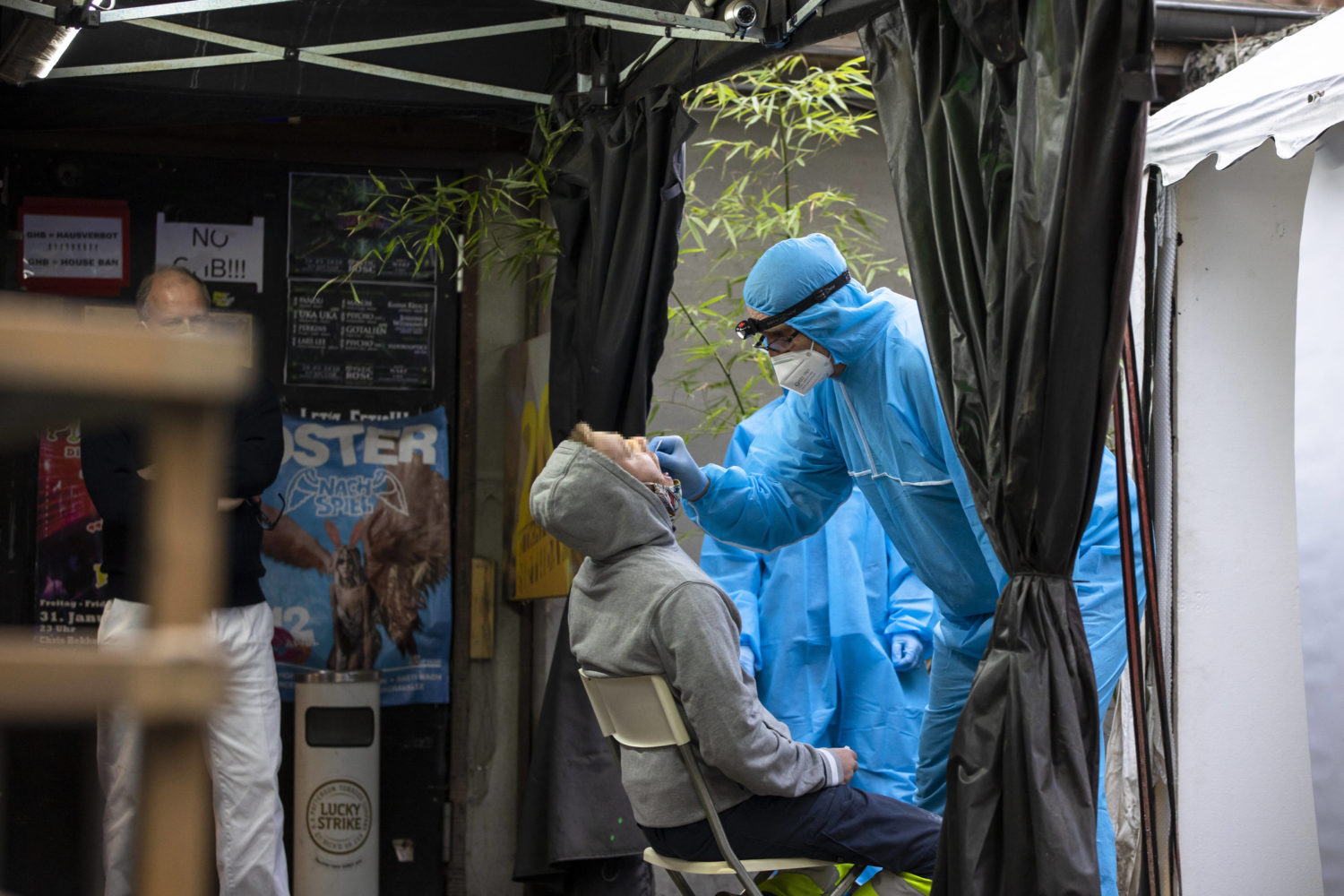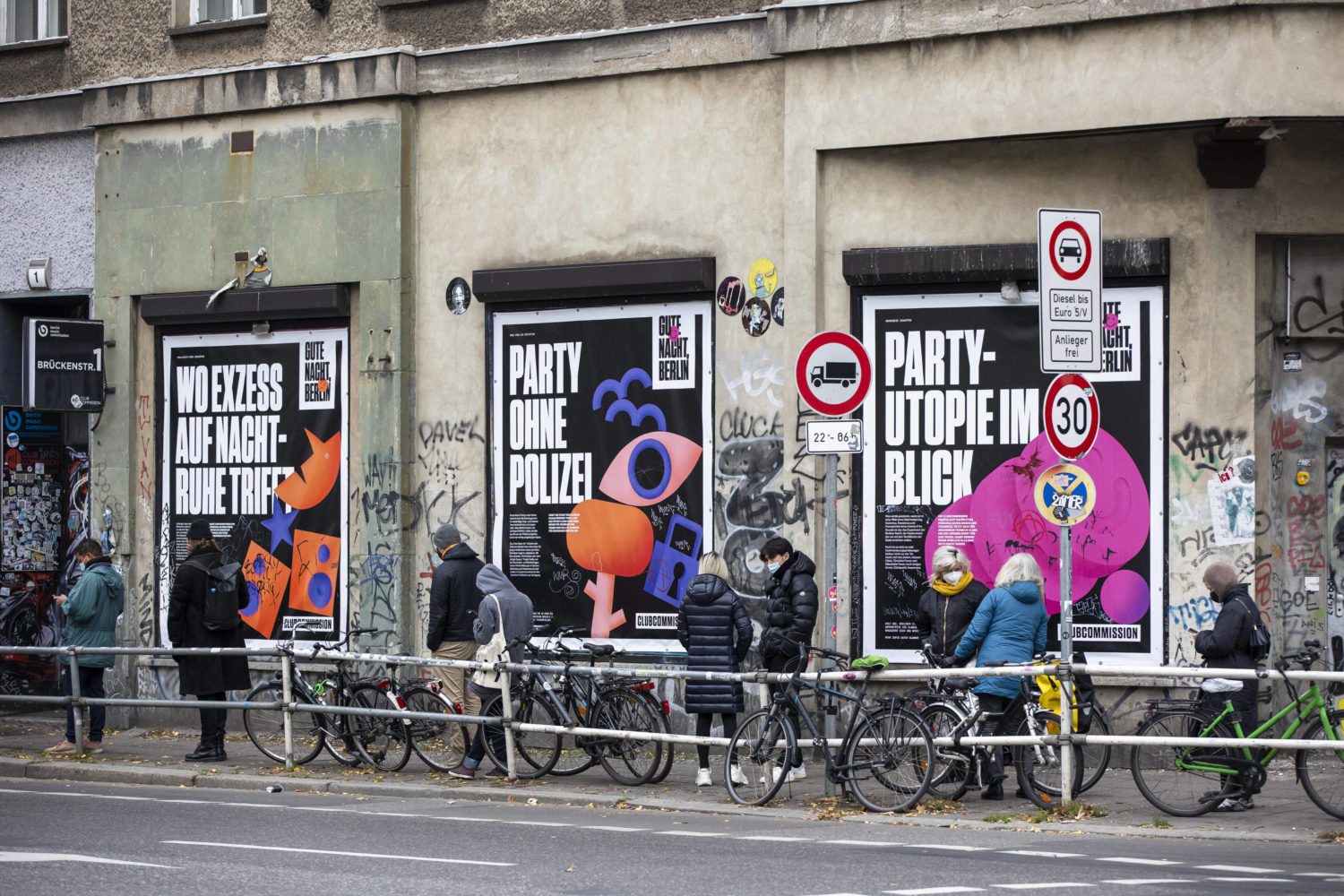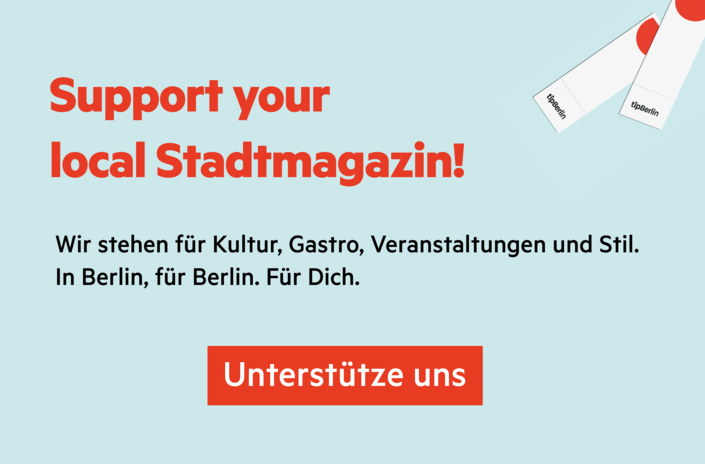Rapid corona tests (Schnelltests in German) are an important tool in the fight against the pandemic. More and more facilities are popping up in Berlin offering rapid tests for those prepared to pay. But how safe is a rapid test? How much does it cost? Where can I get tested in Berlin without an appointment? And how good are the tests for home use? We have the answers to the most important questions about Covid-19 rapid tests.

Can I take a rapid corona test at home?
Yes and no. The Infection Protection Act actually prohibits “the provision of in-vitro diagnostics to laypersons for the direct or indirect detection of a notifiable disease”. However, since the situation in Germany is serious, schools and day-care centres have been allowed to obtain rapid corona tests to administer themselves since December 4th, 2020.
The easing of the Infection Protection Act and an amendment to the Medical Devices Dispensing Ordinance make this possible. However, the ad-hoc relaxation of existing guidelines is controversial. Whether there are enough trained staff in day-care centres and schools to carry out the tests properly remains questionable for the time being.
For the rest of us, the following still applies: anyone who wants to take a test must visit a rapid corona testing facility.
Only one Berlin-based taxi company sends test kits to the patient’s home. However, the results are evaluated by doctors using remote diagnostics. You can read more about this in the list of rapid test centres in Berlin below.
What types of rapid corona tests are there — and how safe are they?
Rapid antibody test The high-street drugstore dm has been selling corona antibody tests for home use for a few weeks. However, an acute infection is not detected by this type of test. The antibody test only identifies existing coronavirus antibodies (remnants of the body’s immune response to an earlier infection, not the virus itself) and thus indicates whether the patient was previously infected with the virus.
Rapid antigen test This type of rapid test currently holds the greatest hope. The rapid antigen test looks for molecules typical of the corona virus in the sample and indicates whether an acute infection is present. The advantages: the test delivers a result in less than 30 minutes, and a positive test result also has an actual significance of 95 percent.
However, as is always the case with a negative corona test result, the following also applies to the antigen rapid test: a negative test result must be treated with caution. Rapid antigen tests can be negative if the viral load is not yet high or no longer high enough at the time of testing. This means when a patient is in the initial or final stages of the disease.
PCR test The most accurate of the rapid corona tests. The PCR test detects 99.5 per cent of the genetic material of the virus, but requires large, state-of-the-art automated analysis for this and is therefore not suitable as a self-test for home use.
Nevertheless, a few laboratories in Germany already offer PCR tests on the basis of remote diagnostics. The patient takes a cotton swab from a test kit sent to him/her, performs the throat swab at home and then sends the sample in a preservative solution to the laboratory.
Where have corona rapid tests been used so far?
In mid-October 2020, the national Covid-19 testing strategy was updated to advocated the use of rapid tests in clinics and nursing homes in future. The facilities must create testing strategies for this.
At the end of November 2020, it was also announced that the Berlin Senate is considering the use of rapid tests in schools. Teachers and other school staff are to be tested regularly — not the pupils themselves.
Since December 1st, the quarantine period can also be reduced by a rapid test. Anyone who can show a negative corona rapid test result after ten days can end their quarantine before 14 days have elapsed.
Can I get a rapid corona test in Berlin? If so, where?

More and more rapid testing facilities are opening in Berlin for those prepared to pay. Thanks to their fast and uncomplicated results, antigen tests, in particular, are used for these services. In some places in Berlin, the more reliable PCR tests are also offered. Most test centres work with online appointments, but some also test patients spontaneously. We have an overview of the test centres and their conditions (as of December 7th, 2020):
- Corona-Schnelltest-Station in Auguststraße In mid-November 2020, the first Covid-19 Schnelltest station opened on Auguststraße in a Mitte art gallery. The tests are carried out by a team of medical students and staff trained by a doctor. On site, private individuals can take a rapid antigen test and even a PCR test.
Auguststraße 20, Mitte, Mon-Fri 8am-7pm, Sat+Sun 9am-6pm, antigen test €49, results after 30 minutes on site, PCR test €99, result the next day by email), cash, giro and credit card payment possible, booking appointments and more info here
- Test-Zentrum Moritzplatz Another quick testing facility at Moritzplatz in Kreuzberg has been operating since November 20th. The rapid antigen tests at the Schnelltest-Zentrum am Moritzplatz are carried out by a team of doctors.
Prinzessinnenstraße 14, Kreuzberg, Mon-Sat 8am-8pm, also open at Christmas, antigen test €49, result after 20 minutes on site, result on site, payment online after booking, appointments and more info here.
- Test station at KitKat Since December 4th, a rapid testing station has been operating at KitKat (usually a techno club). Trained staff carry out the swab tests on site, under the supervision of a doctor. In a Berlin-wide comparison, the antigen rapid tests at KitKat are very affordable.
Köpenicker Straße 76, Mitte, Wed-Sun 10am-1pm, antigen test €24.90, result after 25 minutes on site, giro and credit card payment only, no cash payment possible, online registration and more info here.
- Schnelltest-Station at Strandbad Plötzensee Since Christmas 2020, a drive-in rapid testing station at Plötzensee Lido has been in place. You’ll be tested for COVID-19 using a nasal and throat swab. Online registration is required beforehand.
Nordufer 26, Wedding, 4th-8th January 7am-7pm, Sun 10th January 2021 10am-5pm, further dates will follow after 10th January 2021, daily test capacity 400 swabs, antigen test €39, results after 20 minutes by e-mail or SMS, online registration and all information here.
- Schnelltest walk-in and drive-in at Wellenwerk Where surfers usually ride Berlin’s only indoor wave, there’s a lot of activity despite lockdown. A rapid test station has been set up at Wellenwerk in Berlin-Lichtenberg. Testees can walk or drive in, and the swab will be taken by trained staff. However, those who want to use the drive-in rapid test service must book an appointment online in advance.
Landsberger Allee 270, Lichtenberg, antigen test €29.90, test result sent by email after 30 minutes, payment online by card, appointment booking and all info here.
- Abstrichzentrum at BER At Berlin’s new BER airport, people without coronavirus symptoms can take a PCR rapid test. Here you get the result, usually faster than a conventional corona test, after 24 hours. In contrast to antigen tests, PCR tests are recognised when travelling. If you have an urgent business or private reason for travelling, you can minimise the risk of having to go into quarantine at your destination by taking the PCR test. By registering online in advance, the waiting time on site can be reduced.
Willy-Brandt-Platz, BER, Schönefeld, Mon-Sun 7am-7pm, payment by EC or credit card, online registration and all information here.
- Schnelltest-Station at Max-Schmeling-Halle In the car park of Max-Schmeling-Halle there’s now also a rapid testing centre for COVID-19. Appointments should be made in advance.
Falkplatz 1, Prenzlauer Berg, for the time being until 9th January, open daily 10am-1pm except Sundays, antigen test €49,90, payment online when booking the appointment, test result after 15-30 minutes by email, appointment booking and all info here.
- Corona-Testzentrum in Westend The rapid test centre in Westend, Charlottenburg, offers antigen tests, PCR tests and antibody tests. Those interested can drop in spontaneously and do not need to book an appointment.
Württembergallee 1 (corner of Heerstraße 12-16) Charlottenburg, Mon-Fri 10am-6pm, Sat+Sun 10am-4pm, antigen test €46, PCR test €86, payment on site by EC, credit card and Google-/Apple Pay possible, test result within 1 hour by email, no appointment necessary, all info here.
- ‘Mein Corona Schnelltest’ at Wriezener Karree Within sight of Berghain, a rapid antigen test station has opened at Wriezener Karree in Friedrichshain. The ‘Mein Corona Schnelltest’ team also offers mobile testing — for companies and event organisers, for example.
Am Wriezener Karree 15, Friedrichshain, antigen test €35.90, digital test result after 15 minutes, payment online via EC card, Paypal and instant bank transfer possible, appointment booking and all information here.
- Arbeiter-Samariter-Bund in Bergmannkiez The Arbeiter-Samariter-Bund Regionalverband Berlin-Nordwest e.V. also offers rapid antigen tests. Those who have booked an appointment slot online should allow 30-40 minutes to visit the test centre.
Gneisenaustraße 40, Kreuzberg, antigen test €39, test procedure incl. administration and waiting time 30-40 minutes, payment by card is favoured, appointment booking and all info here.
- Corona Testzentrum Süd At weekends, Berliners can get tested at the test centre in Lichterfelde without having to wait or make an appointment. Here, doctors take swabs for antigen and antibody tests. On weekdays, it’s also possible to request the team from the Testzentrum Süd at another a location: This service is available for groups of 20 or more.
Lichterfelder Weg 5, Lichterfelde, Sat+Sun 8am-4pm, antibody test €39.95, antigen test €83.20, results within one hour by email, on-site testing for groups of 20 or more, Mon-Fri 7am-4pm, antigen test €76.79 per person, appointments can be made by email or by calling 030/959 999 051, more info here.
- Rapid home testing kit from CityPraxen Berlin Since November 2020, it’s been possible to self-administer a rapid antigen test at home which is then evaluated by a laboratory. CityPraxen Berlin offers this service via remote diagnostics. The test kit is delivered to your home within a few hours. The patient takes the nasopharyngeal swab themselves, and the test results are analysed by doctors using the mobile phone photos of the swab.
Order Mon-Fri until 2 pm, same-day delivery possible with express order, antigen test with express order €71.09, result Mon-Sat on the same day if material is sent by 2pm, test evaluation also on all public holidays, more information here.
- Schnelltest-Station at Kaiser Wilhelm Memorial Church, Kaiser-Wilhelm-Gedächtniskirche, Breitscheidplatz, Charlottenburg, rapid antigen test €40 (for the time being still to be paid privately), payment online when booking appointment, all info here.
- Teststation at Admiralspalast From December 10th, a testing station will also open in Admiralspalast. The team there will be led by a doctor from Charité hospital.
Friedrichstraße 101, Mitte, daily 10am-2pm, antigen test €40 (to be paid privately for the time being), payment in advance when booking appointment, all info here.
Can I also carry out a PCR test myself at home?
Unlike antigen tests, it is not legally possible to offer PCR tests for analysis using remote diagnostics. The evaluation of these very safe rapid tests is too complex for private patients to be able to carry out the swab tests themselves.
Products from around 200 different rapid test manufacturers are currently circulating on the German market, and new rapid testing services spring up almost daily in Berlin. The credibility of each provider must be assessed on a case-by-case basis. Ultimately, it is up to each individual to decide whether to wait for an appointment for a regular test or to use a rapid test.
Why are the prices for rapid Covid-19 tests in Berlin so different?
Just as the costs for other medical services can vary from practice to practice, there are also differences in the pricing of rapid coronavirus tests.
As the Berlin Medical Association explains on request, the different prices result from the material used in each case and from the services calculated according to the Physicians’ Fee Schedule (GOÄ) and the Uniform Evaluation Scale (EBM).
Are there enough rapid tests for everyone?
Yes. Since rapid tests have become an important tool in the fight against the pandemic, production has been successively ramped up. While in October the Germany-wide rapid testing capacity was only sufficient for vulnerable risk groups, now, shortly before Christmas, sufficient antigen rapid tests are available for the broader population. However, the distribution and use of these rapid tests are currently still subject to logistical obstacles.
Do rapid antigen tests offer a glimmer of hope for the cultural sector?
In mid-October, when rapid testing facilities first emerged, part of Berlin’s cultural landscape sensed its chance. The Berlin Club Commission pleaded for the introduction of rapid antigen tests for certainty at the club door. A wish that, for the time being at least, must remain a pipe dream.
Because even with rapid tests, the medical evaluation must be carried out by trained personnel. And this is what is lacking in Germany. When the situation in Berlin has calmed down a bit, quick antigen tests could become a prospect for cultural institutions. But that remains to be seen.
It’s also possible to get a Covid-19 test free of charge at some doctors’ surgeries, as well as official testing centres in Berlin. Here’s how to find them.




